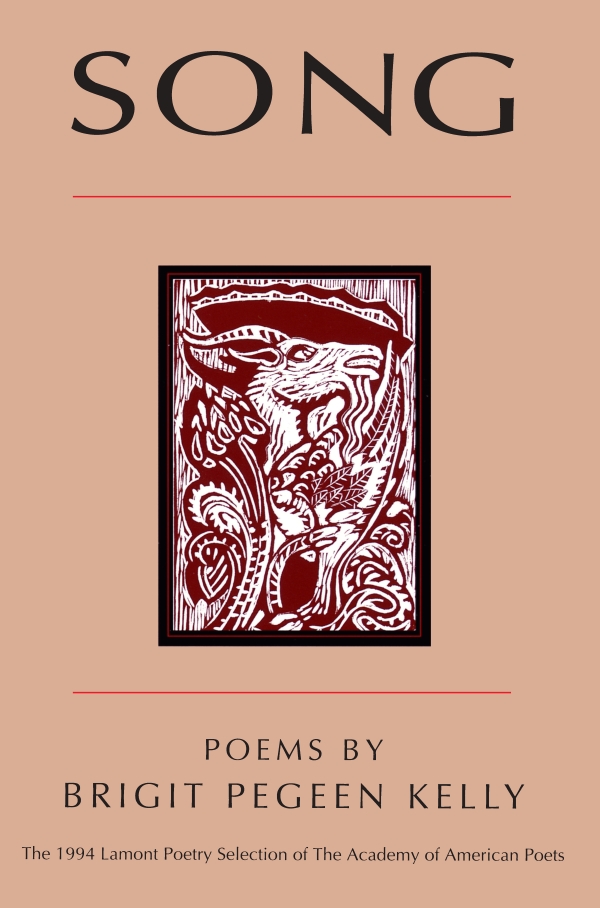Some truck was gunning the night before up Pippin Hill’s steep gradeAnd the doe was thrown wide. This happened five years ago now,Or six. She must have come out of the woods by Simpson’s red trailer—The one that looks like a faded train car—and the driverDid not see her. His brakes no good. Or perhaps she hit the truck.That happens, too. A figure swims up from nowhere, a flying figureThat seems to be made of nothing more than moonlight, or vapor,Until it slams its face, solid as stone, against the glass.And maybe when this happens the driver gets out. Maybe not.Strange about the kills we get without intending them.Because we are pointed in the direction of something.Because we are distracted at just the right moment, or the wrong.We were waiting for the school bus. It was early, but not yet light.We watched the darkness draining off like the last residueOf water from a tub. And we didn’t speak, because that was our way.High up a plane droned, drone of the cold, and behind us the flagIn front of the Bank of Hope’s branch trailer snapped and popped in the wind.It sounded like a boy whipping a wet towel against a thighOr like the stiff beating of a swan’s wings as it takes offFrom the lake, a flat drumming sound, the sound of somethingBeing pounded until it softens, and then—as the wind loweredAnd the flag ran out wide—there was a second sound, the sound of running fire.And there was the scraping, too, the sad knife-against-skin scrapingOf the acres of field corn strung out in straggling rowsAround the branch trailer that had been, the winter before, our town’s claim to fameWhen, in the space of two weeks, it was successfully robbed twice.The same man did it both times, in the same manner.He had a black hood and a gun, and he was so politeThat the embarrassed teller couldn’t hide her smile when he showed up again.They didn’t think it could happen twice. But sometimes it does.Strange about that. Lightning strikes and strikes again.My piano teacher watched her husband, who had been struck as a boy,Fall for good, years later, when he was hit again.He was walking across a cut corn field toward her, stepping overThe dead stalks, holding the bag of nails he’d picked up at the hardware storeOut like a bouquet. It was drizzling so he had his umbrella up.There was no thunder, nothing to be afraid of.And then a single bolt from nowhere, and for a moment the manWas doing a little dance in a movie, a jig, three steps or four,Before he dropped like a cloth, or a felled bird.This happened twenty years ago now, but my teacher keepsTelling me the story. She hums while she plays. And we were hummingThat morning by the bus stop. A song about boys and war.And the thing about the doe was this. She looked alive.As anything will in the half light. As lawn statues will.I was going to say as even children playing a game of statues will,But of course they are alive. Though sometimesA person pretending to be a statue seems farther gone in deathThan a statue does. Or to put it another way,Death seems to be the living thing, the thingThe thing that looks out through the eyes. Strange about that . . .We stared at the doe for a long time and I thought about the wayA hunter slits a deer’s belly. I’ve watched this many times.And the motion is a deft one. It is the same motion the swan usesWhen he knifes the children down by his pond on Wasigan Road.They put out a hand. And quick as lit grease, the swan’sBoneless neck snakes around in a sideways circle, drivingThe bill hard toward the softest spot . . . All those songsWe sing about swans, but they are mean. And up close, often ugly.That old Wasigan bird is a smelly, moth-eaten thing.His wings stained yellow as if he chewed tobacco,His upper bill broken from his foul-tempered strikes.And he is awkward, too, out of the water. Broken-billed and gaited.When he grapples down the steep slope, wheezing and spitting,He looks like some old man recovering from hip surgery,Slowly slapping down one cursed flat foot, then the next.But the thing about the swan is this. The swan is made for the water.You can’t judge him out of it. He’s made for the chapterIn the rushes. He’s like one of those small planes my brother flies.Ridiculous things. Something a boy dreams up late at nightWhile he stares at the stars. Something a child draws.I’ve watched my brother take off a thousand times, and it’s alwaysThe same. The engine spits and dies, spits and catches—A spurting match—and the machine shakes and shakes as if it wereStuck together with glue and wound up with a rubber band.It shimmies the whole way down the strip, past the pondPast the wind bagging the goose-necked wind sock, past the banksOf bright red and blue planes. And as it climbs slowlyInto the air, wobbling from side to side, cautious as a rock climber,Putting one hand forward then the next, not even lookingAt the high spot above the tree line that is the question,It seems that nothing will keep it up, not a wish, not a dare,Not the proffered flowers of our held breath. It seemsAs if the plane is a prey the hunter has lined up in his sights,His finger pressing against the cold metal, the taste of bloodOn his tongue . . . but then, at the dizzying heightOf our dismay, just before the sky goes black,The climber’s frail hand reaches up and grasps the highest rock,Hauling, with a last shudder, the body over,The gun lowers, and perfectly poised now, high aboveThe dark pines, the plane is home free. It owns it all, all.My brother looks down and counts his possessions,Strip and grass, the child’s cemetery the black tombstonesOf the cedars make on the grassy hill, the wind-scrubbedFace of the pond, the swan’s white stone . . .In thirty years, roughly, we will all be dead . . . That is one thing . . .And you can’t judge the swan out of the water . . . That is another.The swan is mean and ugly, stupid as stone,But when it finally makes its way down the slope, over rocksAnd weeds, through the razory grasses of the muddy shallows,The water fanning out in loose circles around itAnd then stilling, when it finally reaches the deepest spotAnd raises in slow motion its perfectly articulated wings,Wings of smoke, wings of air, then everything changes.Out of the shallows, the lovers emerge, sword and flame,And over the pond’s lone island the willow spills its canopy,A shifting feast of gold and green, a spell of lethal beauty.O bird of moonlight. O bird of wish. O sound risingLike an echo from the water. Grief sound. Sound of the horn.The same ghostly sound the deer makes when it runsThrough the woods at night, white lightning through the trees,Through the coldest moments, when it feels as if the earthWill never again grow warm, lover running toward lover,The branches tearing back, the mouth and eyes wide,The heart flying into the arms of the one that will kill her.
All Wild Animals Were Once Called Deer
Feature Date
- October 18, 2021
Series
- What Sparks Poetry
Selected By
Share This Poem
Print This Poem
“All Wild Animals Were Once Called Deer” from SONG: by Brigit Pegeen Kelly.
Published by BOA Editions January 1st, 1994.
Copyright © 1994 by Brigit Pegeen Kelly.
All rights reserved.
First appeared in The Massachusetts Review, Vol. 34 No. 4 (Winter, 1993).
Reproduced by Poetry Daily with permission.

Brian Palmer
Brigit Pegeen Kelly was born in Palo Alto, California, in 1951. Her first collection of poems, To The Place of Trumpets (1987), was selected by James Merrill for the Yale Series of Younger Poets. Song (BOA Editions), which followed in 1995, was the 1994 Lamont Poetry Selection of the Academy of American Poets. Her third collection, The Orchard (2004), was a finalist for the Pulitzer Prize in Poetry, the Los Angeles Times Book Award in Poetry, and the National Book Critics Circle Award in Poetry. Her many other accolades include a “Discovery”/ the Nation award, the Witter Bynner Prize from the Academy of Arts and Letters, the Cecil Hemley Award from the Poetry Society of America, and fellowships from the Academy of American Poets, the Whiting Foundation, the National Endowment for the Arts, the New Jersey State Council on the Arts, and the Illinois Arts Council. Kelly passed away in 2016.
Winner of the 1994 Lamont Poetry selection of The Academy of American Poets.
"Kelly has a talent for coaxing out the world's ghosts and then fixing them in personal landscapes of fear and uncertainty... Smoothed by nuances of sound and rhythm, her poems exude an ambiguous wisdom, an acceptance of the sad magic that returns us constantly to the lives we might have led."
—Library Journal
Poetry Daily Depends on You
With your support, we make reading the best contemporary poetry a treasured daily experience. Consider a contribution today.




